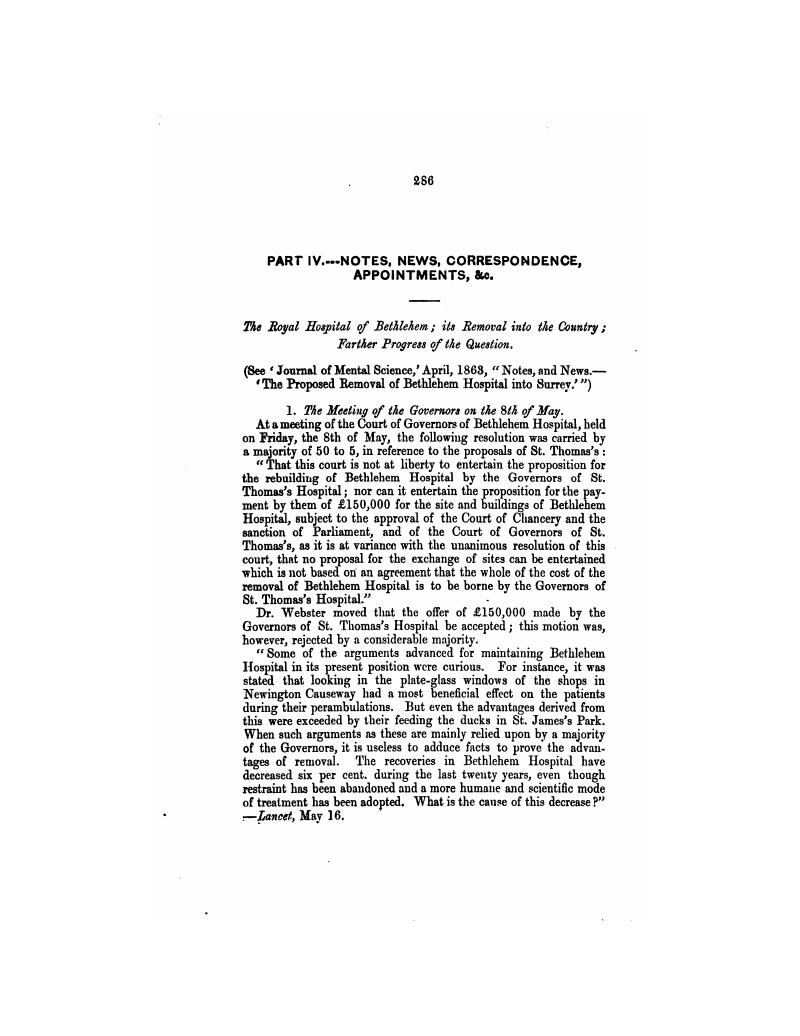No CrossRef data available.
Article contents
The Royal Hospital of Bethlehem; its Removal into the Country; Farther Progress of the Question
Published online by Cambridge University Press: 19 February 2018
Abstract

- Type
- Part IV.—Notes, News, Correspondence, Appointments, &c.
- Information
- Copyright
- Copyright © Royal College of Psychiatrists, 1863
References
∗ “The General Court cf St. Thomas's empowered the Grand Committee on the 21st of April to make two alternative proposals to the Governors of Bethlehem, and these proposals were duly communicated to the latter hy the Grand Committee through their Secretary. To most unprejudiced persons they will appear fair, and even liheral. The Governors of St. Thomas's were prepared ‘eilher to huild for the Governors of Bethlehem a new hospital in conformity with the plans and estimates prepared by Mr. Currey, the surveyor of this (St. Thomas's) Hospital, at a cost not exceeding £150,000, includine the site; or to pay for the site and buildings of Bethlehem the sum of £150,000, subject to the approval of the Court of Chancery and the sanction of Parliament and this Court.’ Unluckily, however, when this resolution was taken by the Grand Court of St. Thomas's the Governors of Bethlehem had already pledged themselves to A condition of sale which no prudent purchaser could accept. They had voted unanimously—that is, some 30 out of 200 Governors had voi ed unanimously—that no proposal for the exchange of sites can lie entertained which is not based on an agreement that the whole of the cost of the removal of Bethlehem Hospital is to be borne by the Governors of St. Thomas's Hospital.’ That is to say, they demanded absolute discsetion to buy an estate, erect an as;lum of indefinite size, and indulge in any architectural fieaks which might please their own taste, without risk to themselves, and at the sole cost of St. Thomas's. The latter was apparently to have no power of checking the items, but only the duty of paying the bill, to the exorbitance of which no limit was assigned. All that we know is that the Governors of Bethlehem intended it to be enormous, for they expressly informed the Grand Committee of St. Thomas's, hy a letter dated May 16, that what they would consider as an equivalent for their present premises would piobably amount to a great deal more than ‘that which the Governors of St. Thomas's would feel themselves at liherty to give, or which would be permitted either by the Court of Chancery or by Parliament to be given, for a site for a new St. Thomas's Hospital.’ They even declined any preliminary discussion of the subject by Committees to he appointed on both sides, and repellad with positive rudeness any overtures which might tend to bring about an amicable settlement,”—Times, June 1.Google Scholar





eLetters
No eLetters have been published for this article.